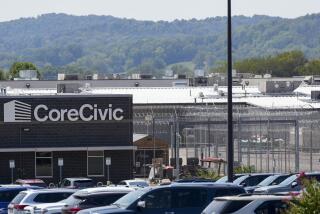Official Cites âReservations, Expectationsâ : U.S. Urged to Study Use of Private Jails
WASHINGTON â The chief of the federal governmentâs criminal justice research unit called Sunday for seriously considering the use of private firms to run jails and prisons at a time when budget-pressured governments are reluctant to build more institutions.
But James K. Stewart, director of the National Institute of Justice, stopped short of recommending private prisons, citing âboth deep reservations and high expectationsâ about the trend and urged instead âa thoroughgoing analysis.â
âWhen we have opportunities to do things more efficiently and more flexibly without in any way harming the public interest, we would be foolish not to explore them to the fullest,â said Stewart, whose agency is an arm of the U.S. Justice Department.
Timing Noted
Stewartâs comments, made in connection with his agencyâs issuance of a preliminary survey of âthe privatization of corrections,â came at a time of mounting controversy over the quality, accountability, security and cost of private prisons.
Prison Expansion Noted
Over the last five years states have added prison facilities with 77,000 beds and plan to increase their capacities over the next 10 years by another 104,688 beds at a cost of more than $5 billion, according to the survey.
âFaced with continually escalating prison and jail populations, it is hardly surprising to find state and local governments searching for alternatives to the traditional ways of meeting the needs for prisoner housing,â the survey noted.
Those who advocate the use of private vendors on efficiency grounds contend they are free from civil service regulation and have lower pension and benefits costs as well as greater market incentives to increase productivity, the survey said.
âLarge Hidden Costâ
But it said opponents contend the costs of private management will eventually escalate and argue that monitoring the work of private providers is âa potentially large hidden cost.â The survey dealt with both the private construction of prison facilities which then are leased or sold to governments and the actual private operation of jail facilities. But it provided no overall totals on the number of such facilities now in operation.
Such Arrangements Studied
Alaska and Ohio have acquired prison beds through lease or purchase agreements, and Arizona, California, Missouri, Illinois, Kentucky and Minnesota are in various stages of considering such arrangements, according to the survey. Colorado, New Mexico and Texas are studying the private operation of jail facilities, it said.
Although the survey did not mention them, private penal facilities are also in operation in Florida, Pennsylvania, Tennessee and Texas.
Among the âpolitical issuesâ raised by the private operation of prisons, the survey said, is the fundamental propriety of shifting from the state to private enterprise the classifying and controlling of inmates, including the use of deadly force.
âThere are those who will argue that some functions (including the administration of justice) are the raison dâetre (reason for being) of government and cannot nor should be delegated,â the survey said.
More to Read
Sign up for Essential California
The most important California stories and recommendations in your inbox every morning.
You may occasionally receive promotional content from the Los Angeles Times.










